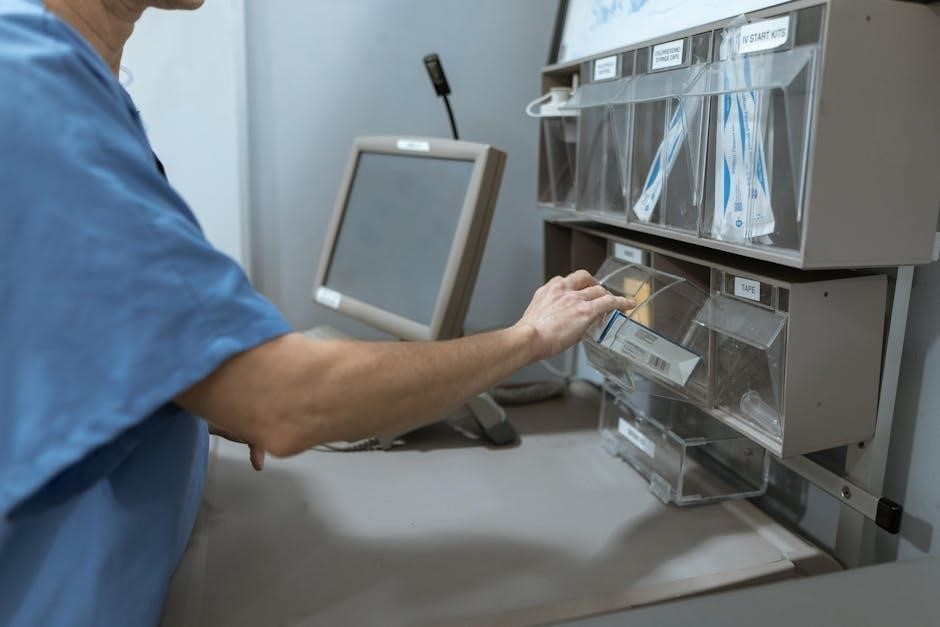1.1 What is a Certified Nursing Assistant (CNA)?
A Certified Nursing Assistant (CNA) is a healthcare professional who assists patients with basic care needs under the supervision of a Registered Nurse (RN) or Licensed Practical Nurse (LPN). CNAs play a vital role in healthcare settings‚ providing essential support with daily living activities‚ medical procedures‚ and emotional comfort.
1.2 Importance of Practice Tests in CNA Preparation
Nursing assistant practice tests are crucial for exam preparation‚ helping candidates assess their knowledge and clinical skills. These tests mirror the actual CNA exam format‚ allowing individuals to identify weaknesses‚ improve confidence‚ and master both written and clinical components effectively.
A Certified Nursing Assistant (CNA) is a healthcare professional who assists patients with daily living activities‚ medical procedures‚ and emotional support under the supervision of a Registered Nurse (RN) or Licensed Practical Nurse (LPN). CNAs are essential in various healthcare settings‚ providing hands-on care to patients. They are also known as Nursing Assistants‚ Patient Care Assistants‚ or State Tested Nurse Aides‚ requiring strong communication and compassion skills to deliver quality patient care effectively.
Practice tests are essential for CNA exam success‚ offering a realistic preview of the exam format and content. They help candidates assess their knowledge‚ identify weak areas‚ and improve time management. By simulating actual test conditions‚ practice tests build confidence and reduce anxiety‚ ensuring better performance on the certification day. Regular use of these tools enhances overall readiness and understanding of the material.

Structure of the CNA Certification Exam
The CNA certification exam consists of two parts: a written examination and a clinical skills test. The written exam includes multiple-choice questions‚ while the clinical test evaluates practical skills.
2.1 Written Examination Format and Content
The written exam consists of multiple-choice questions‚ typically 60‚ covering essential topics like patient care‚ infection control‚ and residents’ rights. The format is standardized‚ often based on the NNAAP standards‚ and allows 90 minutes for completion. Questions assess knowledge in areas such as basic nursing skills‚ medical safety‚ and communication. This section evaluates theoretical understanding‚ preparing candidates for real-world scenarios in healthcare settings.
2.2 Clinical Skills Test: Overview and Requirements
The clinical skills test evaluates practical abilities‚ requiring candidates to demonstrate 3-6 randomly selected nursing skills within 35-45 minutes. Key skills include hand hygiene‚ vital sign measurement‚ and patient transfers. Candidates must perform tasks accurately‚ following proper procedures. Competency is assessed on adherence to safety protocols‚ attention to detail‚ and ability to complete tasks effectively. This section ensures hands-on readiness for real-world patient care scenarios.

Benefits of Using Nursing Assistant Practice Test PDFs
3.1 Advantages of PDF Format for Study Materials
Nursing assistant practice test PDFs offer convenience and accessibility‚ allowing candidates to study offline and print materials. They provide clear‚ structured content for effective exam preparation.
3.2 How Practice Tests Improve Exam Readiness
PDF practice tests simulate real exam scenarios‚ helping candidates familiarize themselves with question formats and timing. They enhance knowledge retention and identify areas needing improvement.
Nursing assistant practice test PDFs are portable and accessible without internet‚ making them ideal for offline study. They allow printing‚ enabling traditional study methods and easy reference. PDFs are compatible with all devices‚ ensuring flexibility for candidates to prepare anywhere. Their consistent formatting enhances readability‚ while downloadable options provide instant access to essential materials for efficient exam preparation.
Nursing assistant practice tests enhance exam readiness by familiarizing candidates with the exam structure‚ question formats‚ and time constraints. They help identify knowledge gaps and strengthen weak areas‚ ensuring focused study. Regular practice builds confidence‚ reduces test anxiety‚ and improves critical thinking. Additionally‚ instant feedback and explanations enable candidates to understand mistakes‚ refining their approach and maximizing their readiness for the actual CNA certification exam.

Key Topics Covered in CNA Practice Tests
CNA practice tests cover essential topics such as patient care‚ infection control‚ residents’ rights‚ and clinical skills‚ ensuring comprehensive preparation for the certification exam.
4.1 Basic Nursing Skills and Patient Care
Basic nursing skills and patient care are fundamental components of CNA practice tests. These include essential tasks like bathing‚ dressing‚ and feeding patients‚ as well as vital sign measurement and documentation. Practice tests also cover infection control practices‚ such as proper hand hygiene and use of personal protective equipment‚ ensuring candidates are well-prepared to deliver safe and effective care.
4.2 Infection Control and Medical Safety
Infection control and medical safety are critical areas covered in CNA practice tests. Questions focus on proper handwashing techniques‚ use of personal protective equipment (PPE)‚ and isolation protocols to prevent the spread of infections. Additionally‚ test topics include safe medical practices‚ such as handling bodily fluids and disposing of biohazardous materials. These skills are essential for maintaining a safe environment for both patients and healthcare workers.
4.3 Residents’ Rights and Confidentiality
Nursing assistant practice tests emphasize residents’ rights and confidentiality‚ ensuring CNAs understand patient autonomy and privacy laws. These sections cover respecting patients’ decisions‚ maintaining dignity‚ and protecting personal health information. Questions also address ethical considerations‚ such as handling patient records securely and respecting cultural preferences‚ to ensure holistic‚ respectful care is provided.

How to Prepare for the CNA Exam
Effective preparation involves creating a structured study plan‚ utilizing practice tests‚ and focusing on weak areas. Prioritize understanding key concepts and managing time efficiently during practice sessions.
5.1 Study Guides and Recommended Resources
Utilize CNA study guides and workbooks to reinforce learning. Downloadable PDFs provide real test questions‚ detailed answers‚ and flashcards. These materials cover essential topics like infection control‚ residents’ rights‚ and clinical skills. Comprehensive guides align with NNAAP standards‚ ensuring thorough preparation. Printable resources allow for flexible study sessions‚ helping candidates master key concepts and improve exam readiness effectively.
5.2 Time Management and Test-Taking Strategies
Effective time management is crucial for success on the CNA exam. Allocate time wisely during practice tests to simulate real exam conditions. Prioritize answering high-confidence questions first‚ then return to challenging ones. Skim through questions to identify key details and use the process of elimination for multiple-choice answers. Practice tests help improve speed and accuracy‚ ensuring readiness for the actual exam.
Popular Sources for CNA Practice Tests
Popular sources for CNA practice tests include official websites like Prometric and Pearson Vue‚ offering free and paid resources. Study guides like the NHAAP and CNA Study Guide 2022-2023 provide comprehensive materials. Websites such as PracticeTestGeeks offer downloadable PDFs with real test questions‚ ensuring exam readiness. These resources cater to diverse learning needs‚ from free practice tests to detailed workbooks.
6.1 Free Online Practice Tests and PDF Downloads
Free online practice tests and PDF downloads are widely available‚ offering convenient study materials for CNA exam preparation. Websites like PracticeTestGeeks and Quizlet provide downloadable PDFs with real test questions and answers‚ while platforms like NHAAP and CNA Study Guide 2022-2023 offer comprehensive practice exams. These resources include multiple-choice questions‚ clinical scenarios‚ and rationales‚ helping candidates familiarize themselves with exam formats and improve their readiness.
6.2 Paid Resources and Comprehensive Study Materials
Paid resources offer detailed study materials and practice tests tailored for CNA exam success. Platforms like Prometric and Pearson Vue provide official practice exams with real-time scoring. Additionally‚ websites such as Killexams offer exam dumps in PDF format‚ containing extensive question banks and answers. These premium tools enhance preparation by providing in-depth review and simulations‚ ensuring a thorough understanding of both written and clinical skills required for certification.
Understanding the NNAAP Standards
The National Nurse Aide Assessment Program (NNAAP) sets the benchmark for CNA certification‚ ensuring candidates meet essential competencies. Over 20 states use NNAAP standards‚ covering both written and clinical skills assessments to validate knowledge and hands-on abilities.
7.1 National Nurse Aide Assessment Program (NNAAP) Overview
The National Nurse Aide Assessment Program (NNAAP) is a standardized evaluation system for CNAs‚ ensuring they meet minimum competency requirements. It consists of a written exam and a clinical skills test‚ assessing both knowledge and hands-on abilities. Over 20 states adopt NNAAP standards‚ making it a widely recognized certification process. The program aims to uphold patient care quality and safety nationwide.
7.2 State-Specific Variations in Exam Requirements
While the NNAAP standards are widely adopted‚ some states implement their own certification programs‚ leading to variations in exam requirements. For example‚ Florida uses Prometric‚ while Arizona employs Diversified Technologies. These differences affect exam content‚ administration‚ and clinical skills tested. Despite these variations‚ the core focus remains on patient care‚ safety‚ and competency. Practice tests tailored to specific state requirements help candidates prepare effectively.

Common Challenges in CNA Exam Preparation
Candidates often face challenges such as managing time effectively‚ overcoming test anxiety‚ and addressing knowledge gaps. These issues can hinder exam readiness and confidence.
8.1 Overcoming Test Anxiety and Building Confidence
Test anxiety is a common challenge for CNA candidates‚ often stemming from fear of failure or unfamiliarity with exam formats. To overcome this‚ practice tests are invaluable‚ as they familiarize individuals with question styles and content‚ reducing nerves. Techniques like deep breathing‚ positive affirmations‚ and structured study plans can also help manage stress. Building confidence comes from consistent preparation and mastering key skills‚ ensuring candidates feel ready for exam day.
8.2 Addressing Knowledge Gaps and Weak Areas
Identifying and addressing knowledge gaps is essential for CNA exam success. Practice tests reveal weak areas‚ allowing focused study. Reviewing incorrect answers and rationales improves understanding. Flashcards and study guides can reinforce concepts‚ while targeting high-weightage topics ensures comprehensive preparation. Persistent practice builds proficiency‚ helping candidates overcome deficiencies and approach the exam with improved competence and assurance.

The Role of a Nursing Assistant
A certified nursing assistant provides essential patient care‚ including daily living activities‚ vital sign measurement‚ and communication support. Their role ensures patients receive compassionate‚ high-quality assistance‚ promoting well-being.
9.1 Responsibilities and Scope of Practice
A Certified Nursing Assistant (CNA) is responsible for assisting patients with daily living activities‚ such as bathing‚ dressing‚ and eating. They monitor vital signs‚ ensure patient safety‚ and maintain a clean environment. CNAs also communicate patient needs to healthcare teams and document care provided. Their scope of practice includes basic care tasks under the supervision of licensed nurses‚ adhering to ethical and legal standards to promote patient well-being.
9.2 Essential Skills for Success in the Field
Success as a nursing assistant requires strong communication‚ compassion‚ and attention to detail. CNAs must possess basic nursing skills‚ such as taking vital signs and providing personal care. Time management‚ adaptability‚ and teamwork are also crucial. Emotional resilience and empathy help build trust with patients. Proficiency in infection control and medical safety ensures a safe environment. These skills collectively enable CNAs to deliver high-quality patient care and thrive in healthcare settings.
Clinical Skills to Master for the Exam
Mastering clinical skills like hand hygiene‚ vital sign measurement‚ and patient transfers is essential for the CNA exam. These skills ensure patient safety and demonstrate competency.
10.1 Hand Hygiene and Infection Control Practices
Hand hygiene is a critical skill for CNAs‚ involving proper washing and glove use to prevent infection spread. Practice tests emphasize correct techniques and timing‚ ensuring adherence to safety protocols. Infection control practices‚ such as isolating contagious patients and disinfecting equipment‚ are also evaluated. Mastery of these skills is essential for patient safety and successful exam performance.
10.2 Vital Sign Measurement and Documentation
Accurate measurement and documentation of vital signs‚ such as blood pressure‚ pulse‚ respirations‚ and temperature‚ are essential CNA skills. Practice tests emphasize proper techniques for obtaining readings and recording them clearly. Understanding normal ranges and identifying abnormalities is critical for effective patient care. Correct documentation ensures continuity of care and legal compliance‚ making it a key focus in CNA practice exams.

Test-Taking Tips for the Written Exam
Mastering multiple-choice strategies is key to success. Eliminate incorrect answers first‚ read questions carefully‚ and manage time effectively to ensure all questions are attempted.
11.1 Strategies for Multiple-Choice Questions
To excel in multiple-choice questions‚ eliminate clearly incorrect answers first and focus on the remaining options. Read each question carefully‚ identifying key terms and concepts. Use process of elimination to narrow choices‚ ensuring a higher probability of selecting the correct answer. Practice these strategies with nursing assistant practice test PDFs to build confidence and improve accuracy.
11.2 Effective Use of Time During the Exam
Allocate a set amount of time for each question to maintain a steady pace. Skip difficult questions initially and return to them after completing easier ones. Use the remaining time to review unanswered or uncertain questions. Avoid spending too long on a single question‚ as it may jeopardize answering others. Practice time management with nursing assistant practice test PDFs to master this skill effectively.

The Importance of Feedback and Review
Feedback and review are essential for identifying strengths and weaknesses. Analyzing test results helps pinpoint areas needing improvement‚ while reviewing mistakes enhances learning and retention.
Practice tests provide insights into performance‚ guiding focused study and boosting confidence for the actual exam.
12.1 Analyzing Test Results for Improvement
Reviewing test results helps identify strengths and areas needing improvement. By examining incorrect answers and understanding rationales‚ individuals can address knowledge gaps. Tracking progress over time ensures focused study‚ enhancing weak areas and building confidence for the CNA exam.
12.2 Learning from Mistakes in Practice Tests
Learning from mistakes in practice tests is essential for effective CNA preparation. By reviewing incorrect answers and understanding the rationales‚ individuals can fill knowledge gaps and improve understanding. This process helps identify common errors and strengthens problem-solving skills‚ leading to better exam readiness and confidence.

Resources for Continuing Education
Utilize CNA study guides‚ workbooks‚ and online forums for continuous learning. These resources provide updated materials‚ practice questions‚ and expert advice to reinforce knowledge and skills effectively.
13.1 CNA Study Guides and Workbooks
CNA study guides and workbooks are essential tools for exam preparation‚ offering detailed practice questions‚ rationales‚ and comprehensive reviews of key topics. These resources are designed to align with NNAAP standards‚ ensuring candidates master both written and clinical skills. Workbooks often include flashcards‚ mock exams‚ and interactive exercises‚ providing a structured approach to learning and retention. They are ideal for self-study and reinforcing exam readiness.
13.2 Online Communities and Forums for Support
Online communities and forums provide invaluable support for CNA candidates‚ offering a space to connect with peers and professionals. These platforms share study tips‚ discuss challenging topics‚ and provide access to additional resources. Interactive forums like Quizlet and Reddit allow candidates to engage in discussions‚ access flashcards‚ and gain insights from experienced CNAs. These communities foster collaboration and motivation‚ helping candidates stay focused and confident throughout their preparation journey.
Final Tips for Exam Day
14.1 What to Bring to the Testing Center
Ensure you bring a valid ID‚ pens‚ and any required documents. Avoid carrying unnecessary items like phones or bags‚ as they may not be allowed in the testing area.
14.2 Maintaining a Positive Mindset
Stay calm‚ arrive early‚ and engage in light exercises or deep breathing to manage anxiety. Remind yourself of your preparation and stay confident throughout the exam.
Bring a valid government-issued ID‚ pens‚ pencils‚ and any required documents‚ such as your training program completion proof. For paper-based exams‚ ensure you have necessary stationery. Avoid bringing unnecessary items like phones or bags‚ as they may not be allowed. Check the testing center’s specific requirements beforehand to ensure compliance and a smooth experience.
Maintaining a positive mindset is crucial for exam success. Focus on your preparation and visualize achieving your goal. Practice relaxation techniques to reduce anxiety‚ such as deep breathing or meditation. Remind yourself of your capabilities and the effort you’ve invested. A confident and calm demeanor will help you approach the exam with clarity and poise.
Mastering nursing assistant practice tests ensures confidence and readiness for the exam. With dedication and the right resources‚ aspiring CNAs can achieve success and excel in their careers.
15.1 Summarizing Key Takeaways
Utilizing nursing assistant practice test PDFs is essential for effective exam preparation. These resources provide real-world questions‚ familiarize candidates with exam formats‚ and highlight areas for improvement. By leveraging these tools‚ aspiring CNAs can build confidence‚ enhance their knowledge‚ and ensure they are well-prepared for both the written and clinical sections of the certification exam.
15.2 Encouragement for Future Success
Embrace your journey to becoming a Certified Nursing Assistant with confidence and determination. Consistent practice and dedication will pave the way for success. Remember‚ every effort invested in mastering the material and honing your skills brings you closer to making a meaningful impact in healthcare. Stay committed‚ remain positive‚ and trust in your ability to excel. Your future as a compassionate and skilled CNA is bright!
